No matter the language – French, Spanish, Portuguese, Lingala – the faces of the migrants staying in the Portland Expo darken when they hear the words for “The Mountain of Death.”
Scores of families, totaling more than 300 men, women and children, traveled thousands of miles to Portland from central Africa in recent weeks, fleeing violence and political instability in their home countries. The influx of asylum seekers has sparked an all-hands response from the city, which opened the local basketball arena as a shelter. Concerned donors have poured more than half a million dollars into the relief effort.
As the migrants rested on cots in the Expo and recounted their long journeys through Central America and Mexico, a pattern began to emerge.
They hacked their way through the same jungles, forded the same rivers, and clung to the sides of the same mountains. There were acts of violence and charity, births and deaths. Along the way, word passed from mouth to mouth about a far-off place that would welcome them: Portland, Maine.
Together, their journeys form one story, told to the Portland Press Herald/Maine Sunday Telegram mostly in French. The details, sometimes horrifying, come from the migrants’ recollections. They are bolstered by their similarity, as well as video and photo evidence collected by the migrants themselves.
By definition, asylum seekers are applying for protection in their host countries. They cannot be economic migrants, in search of a better standard of living. They must be fleeing danger at home.
THE ESCAPE
This past December, Coco Ikoko received word that he was about to be arrested.
Ikoko, a 45-year-old resident of Kinshasa, capital of the Democratic Republic of the Congo, was a member of a pro-democracy group at odds with then-President Joseph Kabila.
Known by the acronym APARECO, for “The Alliance of Patriots for the Refoundation of the Congo,” the political action group operates largely underground. Its president, Honoré Ngbanda, issues his proclamations from an undisclosed location, exhorting his country to “take back” the rich natural resources – gold, copper, tin, cobalt, timber, oil – that have been plundered for centuries by outside powers.
“We’re the only ones who truly scare them,” Ikoko said of the Congolese government, speaking outside the Portland Expo last week.
The country’s political instability is amplified by simultaneous, enmeshed conflicts: Hutu-Tutsi violence spilling over from neighboring Rwanda and Burundi, and Kabila’s attempts to solidify his power, which led to bloodshed involving both outside forces and, increasingly, his own citizens.

Coco Ikoko poses for a portrait outside the Portland Expo earlier this month. He fled his home in the Democratic Republic of the Congo after he was told he would be arrested because of his involvement in an underground political group. Press Herald staff photo by Brianna Soukup
Though Kabila stepped down earlier this year, the conflicts continue and have displaced roughly 5.3 million people both internally and externally, nonprofit researchers at Human Rights Watch estimate. Despite its vast resources, the Congo remains one of the poorest countries in the world.
As soon as he joined APARECO several years ago, Ikoko made an escape plan. In 2017, he sent his wife and children to France after receiving death threats.
So when an informant inside the government sent a warning late last year, Ikoko was ready. He hurried to catch a boat across the Congo River to Brazzaville, capital of the Republic of the Congo, a smaller neighboring country. There, he took a plane to Addis Ababa, Ethiopia, and then another to Quito, Ecuador.
“If they catch you, it’s death or prison,” he said.
Jean-Paul Kakweni, another Kinshasan staying at the Expo, knows this all too well. On May 5, 2018, he woke up around midnight to banging at the door: police.
An administrator for the Red Cross in the Congo, Kakweni says the government targeted him for his work in international aid, which it considers a means of outside pressure.
Kakweni spent six months in prison, where he was tortured. Scars now cover his legs, and he is missing teeth.

Jean-Paul Kakweni talks about his journey from the Democratic Republic of the Congo, where he was a Red Cross worker before fleeing the country. He is staying at an emergency shelter for asylum seekers in Portland with his pregnant wife and one of his three children. The other two children were left behind. Derek Davis/Staff Photographer
Last December, the police brought him, a bloody mess, to the hospital.
His wife and children didn’t know what had become of him, and Kakweni himself didn’t know whether he would be released or jailed again. The only visitor allowed was a priest, who prayed with him and promised to come back. A day or two later, when the hospital was running a skeleton-crew shift, the priest returned with bribes for employees.
Free, Kakweni rushed home at night and woke his wife. “We have to go. Now.”
Fearing for their lives, without time or resources and facing what they knew would be a risky journey, they left behind Préfina, their 12-year-old daughter, and Jefthé, their 9-year-old son. Their youngest child, a toddler who couldn’t fend for herself, came with them to Portland. Kakweni says he couldn’t imagine surviving on the road with all three children, but now hopes to bring them here with help from the Red Cross and the U.S. government.
“I need my children,” he said, his voice shaking. “Imagine: children, alone, without their parents. What will become of them?”
THE INTERLUDES
Some families’ paths to Portland were direct, while others detoured.
Thérèse Ononye and her husband, Arthur, left the Congo in 2015. Caught in the unrest that swept the country when Kabila refused to resign as he neared his term limit, the Ononyes headed south to Angola.
The family didn’t necessarily plan to arrive in the United States. But Angola, too, is struggling with political violence in the aftermath of a 26-year civil war, and has sent many of its own asylum seekers to Portland. Language was a problem: The Ononyes, from the Francophone Congo, couldn’t navigate tribal conflicts and civil disorder in Angola, a former colony of Portugal.

Thérèse Ononye and and her daughter Melissa-Paoula Ononye, 2, on their cot at the Portland Expo on Tuesday. Ononye and her husband left the Congo in 2015 and Melissa was born in Brazil. Press Herald staff photo by Brianna Soukup
“If you don’t speak Portuguese in Angola,” Thérèse said, “they treat you like a foreigner.”
So they flew to Brazil, where they had a daughter, Melissa-Paoula. Two years passed in the favelas, or slums, of São Paulo. Finally, struggling to support themselves and fearing for their safety from crime in the favelas, they boarded a bus to Ecuador.
Life events intervened for Ikoko, as well. After landing in Quito, the capital of Ecuador, he met his second wife, an Angolan refugee whom he declined to name. After traveling with his stepchildren for thousands of miles, Ikoko sees them as his own.
In the past, people fleeing African homelands would more likely have traveled north across the Mediterranean Sea to Europe. But in recent years, more welcoming policies and attitudes in South America have drawn migrants west. And, for many, it is a first step on a longer journey to the United States.
Many migrants enter through Ecuador because the country doesn’t require visas to pass through. From there, the migrant road heads to Colombia, and on through Central America.
A RICKETY CROSSING
For many years, the neck connecting Central and South America, a region known as the Darién Gap, has been no man’s land.
Too dangerous sometimes for government soldiers to enter, the jungle-bound land border between Colombia and Panama is a stop on the cocaine trafficking route, as well as a hideout for bandits and guerrillas. The corridor is treacherous for reasons geographic as well as political; swamplands, rainforests, and tall mountains make road-building difficult.
So the migrant trail weaves around, in part, by sea.
In late May, Coco Ikoko and his family boarded a smuggler’s 20-foot Yamaha speedboat to begin the four-hour passage to the Darién. Soon, the small vessel and its 50 occupants were engulfed by ocean waves.
Then the engine stalled, leaving them helpless on the open sea. Ikoko does not consider himself a religious man, but in crises, he follows the Bantu spiritual custom of calling on one’s ancestors for help. As the boat rocked, as women vomited and children wailed around him, the normally unflappable Ikoko grasped for thoughts of his parents – Joseph, the giant of his village, who personified strength, and Louise, his late mother, whose memory he summons for safety and protection.
He knew before he paid the coyotes $40 to board that there were deaths every day on the ocean route. “But there was no choice,” he said.
Happily for Ikoko and his family, the coyotes managed to restart the engine and motor in safety to Capurganá, a fishing village on Colombia’s border with Panama.
Once a well-known, if remote, ecotourism destination, the town now serves as a debarkation point for thousands of migrants each year. Publicity photos online advertise rippling palm fronds and warm azure coves.
Yet the travelers had their minds on the road ahead, which passes through some 60 miles of dense forest and steep mountains to reach the more settled regions of Panama.
Thérèse Ononye also landed in Capurganá. She cast about for traveling companions, settling on a group of four families she felt she could trust. Some of them are staying with her at the Expo today, while others lagged behind in Central America. A few remain in the Darién, where they are buried.
Ikoko planned a brisk traveling regimen – up and walking at dawn, a half-hour break at noon, and back on the trail until dusk.
They would need the preparation.
“After Capurganá,” Ikoko said, “the worst kind of suffering starts.”
‘MOUNTAIN OF DEATH’
The migrant trail through the Darién Gap is not the peaceful nature walk to which New England hikers may be accustomed.
Men travel the path with machetes in hand, chopping back the rainforest’s continual attempts to reclaim it. Where the road wanders or diverges or disappears, guides offer to show the way – for a fee. Sometimes bandits appear from the woods to rob migrants of everything they own. Depending on the circumstances, guides might dip into banditry, and vice versa.
Ikoko drove his family hard in hopes of getting through quickly. For five days, they walked from dawn until dusk, passing other migrants who rested, and sometimes the skeletons of unlucky others. The journey took Ononye eight days; Kakweni, two weeks. When strangers emerged from between the trees, the travelers offered them something – $5, $10 – in hopes of persuading them to guide their party forward, rather than kill or rob them. At night, they gathered around a fire, built to ward off the panthers that caterwauled in the darkness.
“It was an experience that was impossible to describe,” Ononye said last week, her chin trembling at the memory. “People are changed after leaving that forest.”
A few days in, the path slopes upward.
On the Mountain of Death, Ikoko watched some parties grind nearly to a halt, faced with near-vertical slopes. Ononye had the benefit of Indian guides, who for $20 took her on a six-hour climb to the summit – and no farther. The descent, it turns out, is more dangerous. The inclines are too steep for any sort of path; for another six hours, Ononye and her companions inched themselves downward, grasping at tufts of shrubbery for leverage, their children clinging to their backs.
When Ononye and her party reached the bottom, they celebrated. Their guides had told them that the other side of the mountain was only a short distance from civilization.
In a cellphone video of Ononye’s – she recorded many moments of her journey – her group of about 10 rests on a balmy day in a forest clearing. She, Arthur, and Melissa-Paoula wave at the camera, exhausted and smiling.
“Thank God in his grace!” a male companion of hers cries. “We made it.”
But the guides had lied. Hoping to get rid of the group quickly, they said the end was near. In fact, four days of hiking – and the darkest moments of their journey – still lay ahead.
BANDIDOS
The guides had said to follow the river. At times, it ran deep, up to Ononye’s chest as she forded with Melissa-Paoula on her back. At others, it trickled by, barely a stream. Her group went on for two days, expecting at any moment to arrive at a government-run migrant camp and be welcomed with food, water and beds.
At a low ebb, a small group of men waved from the far bank. “Come over here,” they said in Spanish. Ononye’s group waded toward the strangers, thinking they could be guides. There were five or six of them, young, wearing T-shirts and shorts like most people on the road. As the Africans got closer, they could see the men were wearing bandoliers – ammo belts.
“These are not good men,” one of Ononye’s traveling companions whispered, around the time that she glimpsed their guns.
“Take off your bags, your clothes,” the bandits ordered.
They searched everywhere, making sure no valuables were hidden. Then the bandits started to get angry. Ononye doesn’t know why. Maybe there wasn’t enough money; maybe someone said something to irritate them; maybe they just felt like getting violent. Regardless, one of them aimed his gun at a young boy in the migrant party, 14 years old, and shot him in the chest.
As he died, the group scattered into the woods.
Over the next days, the families found each other and regained the trail. But they had left their food and most of their possessions with the bandits. With nothing to eat, a pregnant woman fell ill. The migrant camps and their food and medical supplies were still just a prayer in the distance. She died, and her husband used his machete to scoop out a grave.
In haste or grief, he hacked off one of his own fingers. It lies in the jungle with her.
THE BORDERS
Finally, they emerged from the forest.
The Panamanian government welcomes the Darién Gap’s survivors in camps that flood places such as Peñitas, a tiny village of only a few hundred, with thousands of migrants. They often arrive dehydrated, malnourished, sick with diarrhea. (They almost certainly do not have Ebola, as some in the United States fear. The disease’s incubation period is far shorter than the trip.) Panama feeds them, processes them, and sends them on to the western border with Costa Rica.
In a camp in nearby Chiquito, Panama, Ononye came across an old church friend from the Congo. After a joyful reunion, the man headed to the river to wash away the grime of the Darién. Her friend hadn’t heard, or had ignored, officials’ warnings that the water was off-limits. A venomous river snake bit him. In another of Ononye’s videos, locals and migrants lower his plastic-wrapped body into a grave.
Sometimes by bus, other times walking, the families made their way through Central America. After Costa Rica comes Nicaragua, where officials charged Ikoko’s family $150 a head to pass. Those who had saved some money went on; others stayed behind, begging and doing odd jobs to raise the funds.
From Nicaragua to Honduras, from Honduras to Guatemala, and on to Mexico. Under pressure from the United States, the Mexican government has taken to holding migrants at its southern border. Most of the families stayed in detention for a week or less before officials put them on buses headed north.
Then, with the end seemingly in sight, the journey stalled out.
When the families arrived in northern border towns, Mexican officials informed them that the waiting list to present oneself at a legal port of entry and demand asylum in the United States stretched beyond 1,000 people. America was taking five a day.
The long wait comes from a shift in U.S. policy. Before, it was relatively easy to make an asylum claim at a legal border crossing. In May of last year, as numbers of Central American asylum seekers surged, customs officials instituted a “metering” policy that drastically limits the rate of entry.
Some of the migrants tried multiple border towns. Still, whether in Piedras Negras or Nuevo Laredo, the news was the same. That meant months of waiting, months of living on the street, of begging for food, of looking over one’s shoulder for danger.
An old friend who reunited with Ononye in Mexico, Milena Nzumba Makina, had hiked separately through the same mountains and rainforests, all while pregnant. In the Darién, she went four days without food.
“It was painful,” she said. “It was very, very difficult.”
Now, in borderland limbo, she went into labor. In a hospital in Nuevo Laredo, she gave birth to her daughter, Victoria, who slept beside her during an interview in the Expo last week.
The families grew restless. It was too hard, Kakweni said, to wait while he watched his youngest child cry.
These African migrants crossed the river in late May, videotaped at night by U.S. Border Patrol. While the timing and circumstances of this crossing match the stories recounted by some of the asylum seekers who have streamed into the city this month, it’s not clear whether any of the migrants in this video are among the families now sleeping inside the Expo in Portland. Border Patrol video
“There is no food. There is no space,” he said. “You sleep outside. If you’re sick, you’re sick. If you die, you die.”
“We didn’t have any patience left,” Ononye said. “The suffering was too much.”
Sometimes in groups, in other cases just with their families, the migrants crossed the Rio Grande into Texas. Linking hands with other travelers, Nzumba and her husband pushed through the current with Victoria on their backs.
On the other side, they gave themselves up to the U.S. Border Patrol.
A NEW HOME
Somewhere along the trail, the migrants heard tell of a place called Portland, Maine. None of them could say who first mentioned it, or where, or when. Many of the hundreds of central Africans who crossed the Texan border in recent months had no idea where it was.
Still, they have been asking for it.

Coco Ikoko picks up his friend’s child in the Portland Expo, where he is living with other asylum seekers from the Congo and Angola. Ikoko fled his home in the Congo after he was informed he would be arrested because of his involvement in an underground political group. Press Herald staff photo by Brianna Soukup
Ononye said she had heard of Portland’s existing Congolese community, as well as its social services.
“People said good things about Portland,” she said. “There are programs for us, brothers and sisters (from the Congo) to welcome us.”
“They were very adamant about going to Portland, Maine,” said Tino Gallegos, who works as an immigration liaison for the city of San Antonio, a hub that distributes new arrivals throughout the country. Asylum seekers are free to go where they choose as they pursue cases in immigration courts.
“It was a real surprise to me. Before they came, I knew virtually nothing about Portland, Maine.”
Gallegos said he did some research to try to figure out why central African migrants wanted to come here. He discovered that the address listed as a future residence on many of the immigrants’ forms was for Portland’s Chestnut Street Family Shelter. He also found out that there was an established Congolese community here. And that the city was portraying itself as welcoming to everyone, especially immigrants.
“You have to have (a destination) as a thing to hold on to,” Gallegos said. “People’s idea was: ‘Portland, Maine is our finish line.’ ”
The families left with an address and a court date and, after two days of riding, stepped down from Greyhound buses on Congress Street in Portland.
Droves of asylum seekers have arrived in Maine’s largest city in recent weeks. Officials have housed more than 200 each night in the Portland Expo, the arena for the Maine Red Claws basketball team, and are seeking more permanent shelter for them. Private donations have poured in, too – more than $500,000 as of last week to support the families.
And yet even after thousands of miles, the journey may not be over.
It will take months, if not years, to resolve the asylum claims. Asylum seekers are not legally allowed to work until at least six months after a formal application is prepared and filed. In the meantime, they are dependent on local services and aid groups such as the Immigrant Legal Advocacy Project, or ILAP, whose lawyers visited the Expo earlier this month to outline the legal road ahead.

Volunteer Julie Haddad of Scarborough plays with Melissa-Paoula Ononye, 2, at an emergency shelter for asylum seekers at the Portland Expo. Press Herald staff photo by Derek Davis
“They didn’t make any promises,” Ikoko said.
Many of the migrants have now been sleeping in the Expo for more than two weeks. Amid the uncertainty and boredom, rumors are spreading.
Nzumba Makina, who crossed the Rio Grande with her newborn, has heard that officials are planning to deport those who passed into the U.S. outside a port of entry. She fled the Congo in 2011 as militants swept through her province, burning houses, killing people and raping women.
“I don’t know how they could think of sending us back,” she said, wiping away tears. “If we go back, we die.”
Local immigration advocates and lawyers have tried to assure the migrants that they do not face deportation while they pursue asylum, but the fears persist.
One asylum seeker with a Twitter account said last week that he had heard armed police were coming to take them away, possibly referring to a called-off Trump administration raid on immigrant communities in 10 major U.S. cities. Some migrants may be moving on to Canada, community leaders and city officials have heard.
The asylum seekers who spoke to the Portland Press Herald/Maine Sunday Telegram said they planned to stay.
Kakweni, the Red Cross employee, wants to keep working for the aid group while he reunites his family in Maine.
Ikoko, once a merchant, plans to work in construction – he sees building a home for someone as a deep expression “of love” – and also wants to organize political exiles in the U.S. to lobby for democratic government in the Congo.
Ononye, who worked as a hairdresser back home, wants to teach at a beauty school here.
Late one morning last week, Ononye sat in a folding chair in the Expo, reflecting on the journey she had shared with the scores of families sleeping on row after row of cots behind her. Melissa-Paoula giggled nearby, playing tug-of-war over a stroller with other stir-crazy children.
“We risked our lives to get here,” Ononye said. “And now we’re here. And that brings us joy.”
Staff Writer Randy Billings contributed to this report.

Send questions/comments to the editors.

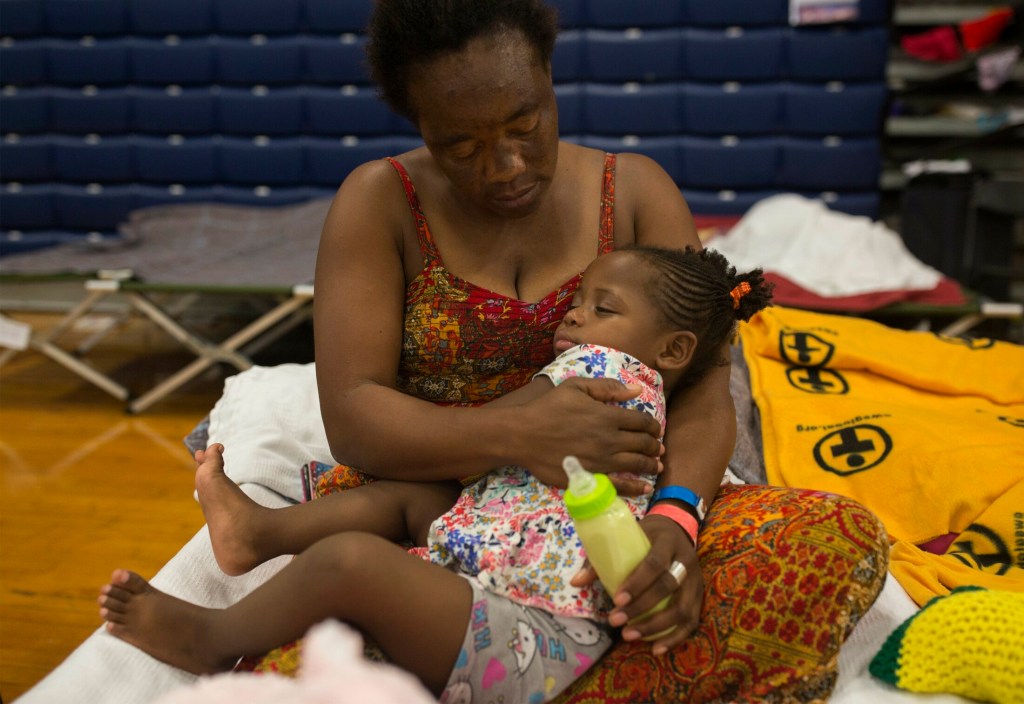
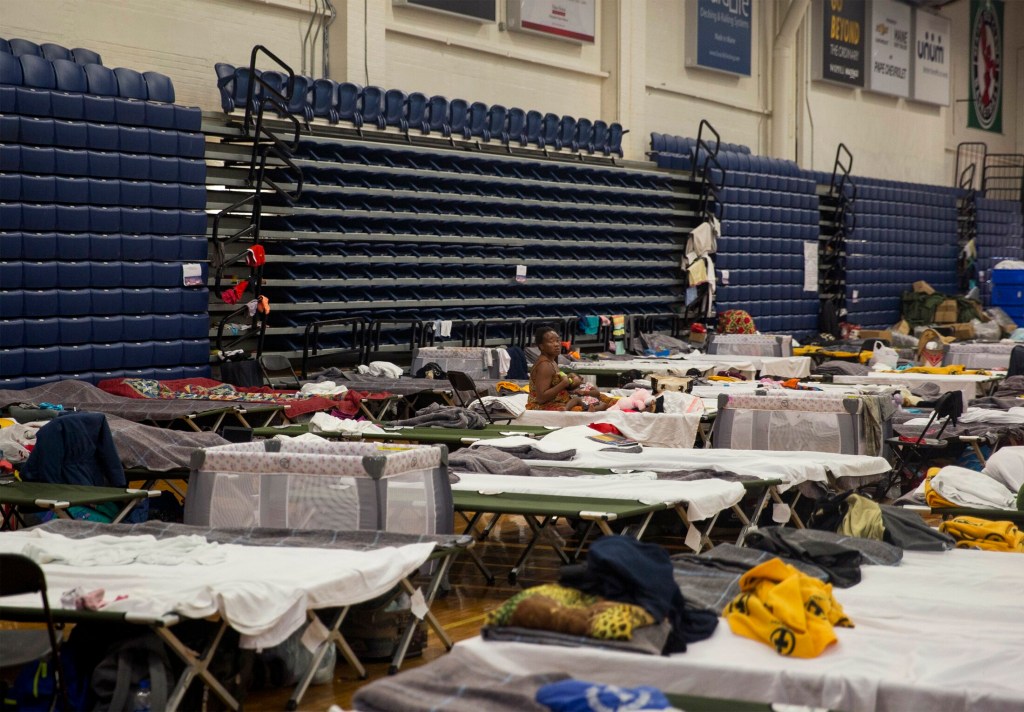
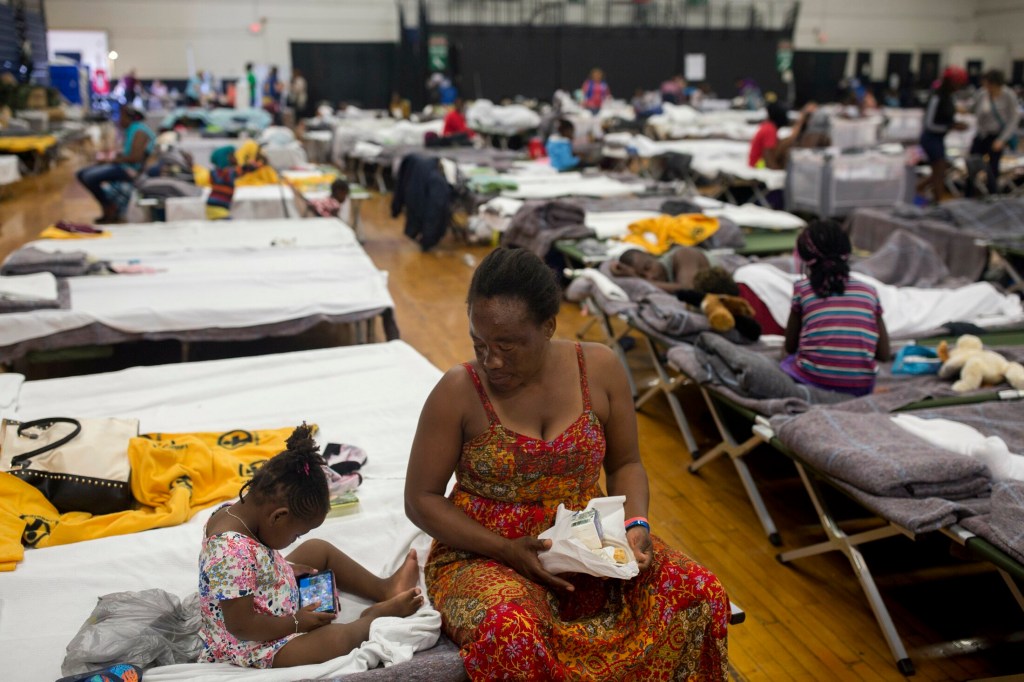
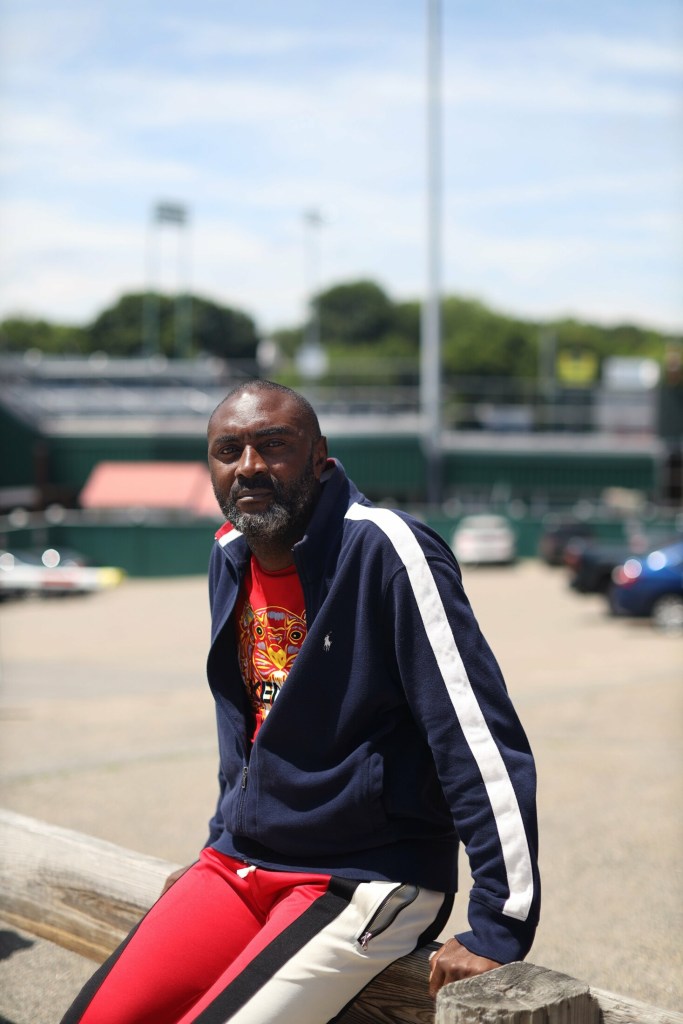
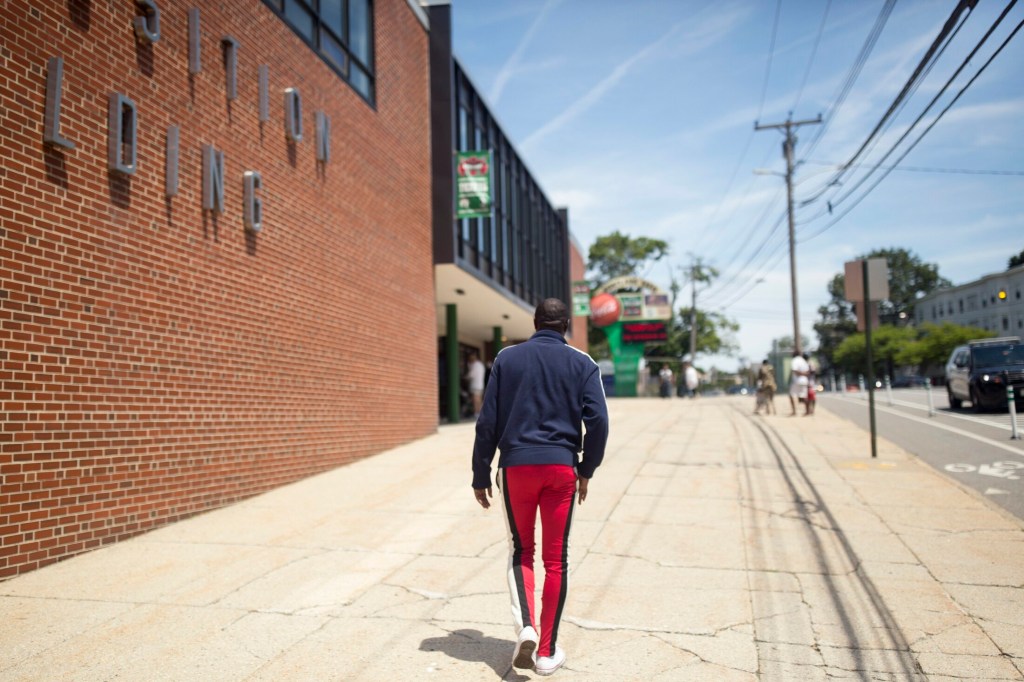
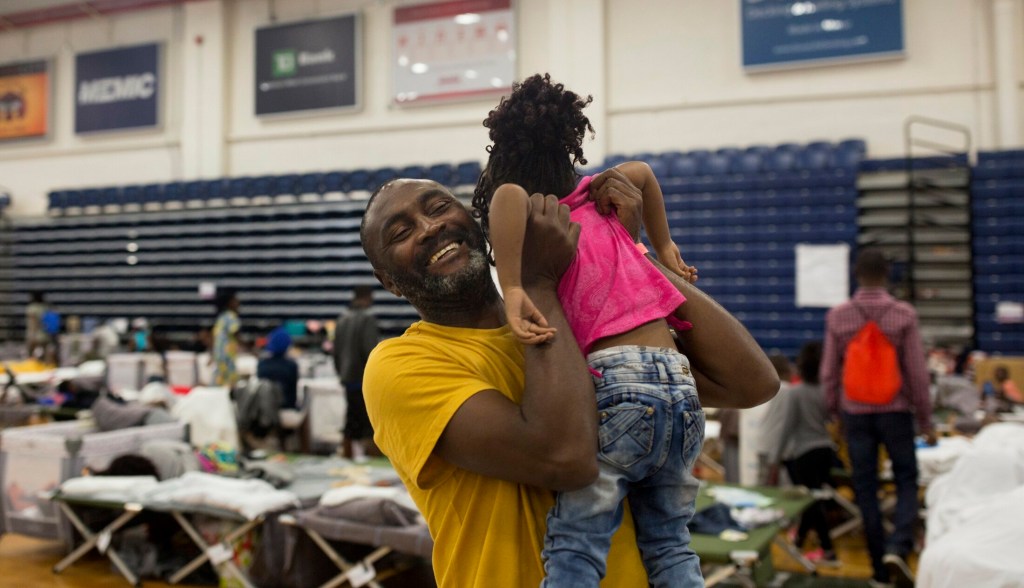
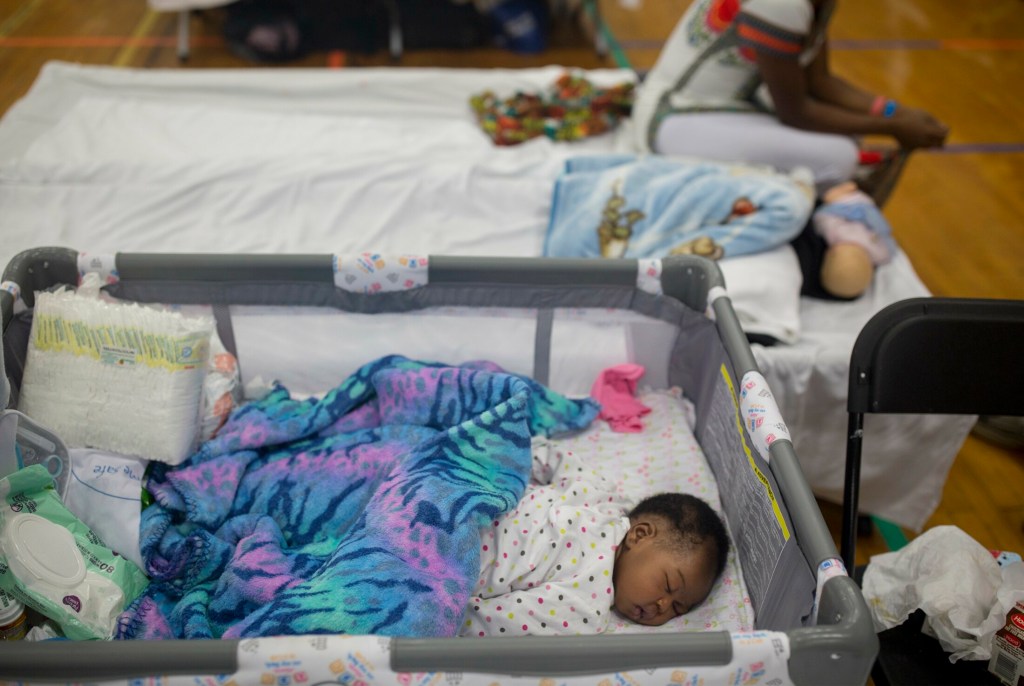
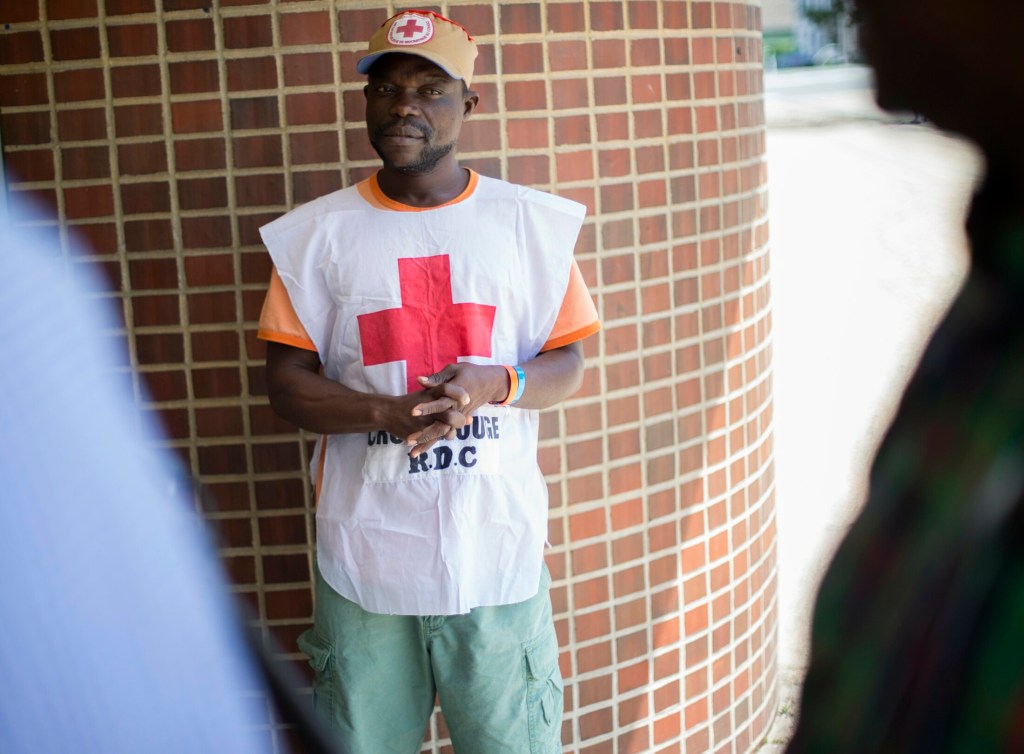
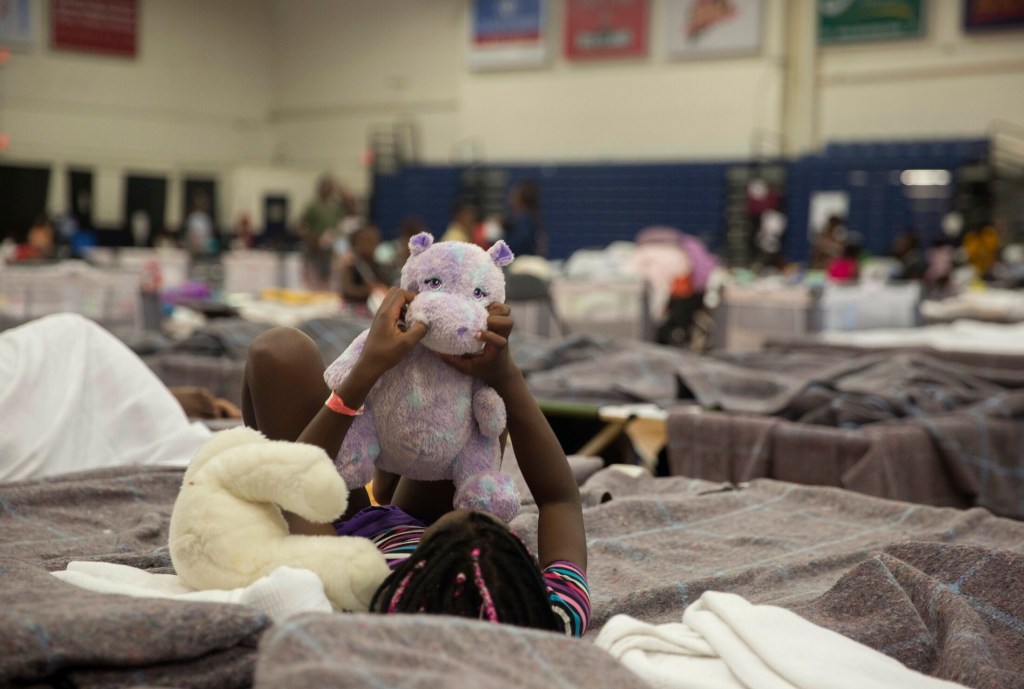

Success. Please wait for the page to reload. If the page does not reload within 5 seconds, please refresh the page.
Enter your email and password to access comments.
Hi, to comment on stories you must . This profile is in addition to your subscription and website login.
Already have a commenting profile? .
Invalid username/password.
Please check your email to confirm and complete your registration.
Only subscribers are eligible to post comments. Please subscribe or login first for digital access. Here’s why.
Use the form below to reset your password. When you've submitted your account email, we will send an email with a reset code.